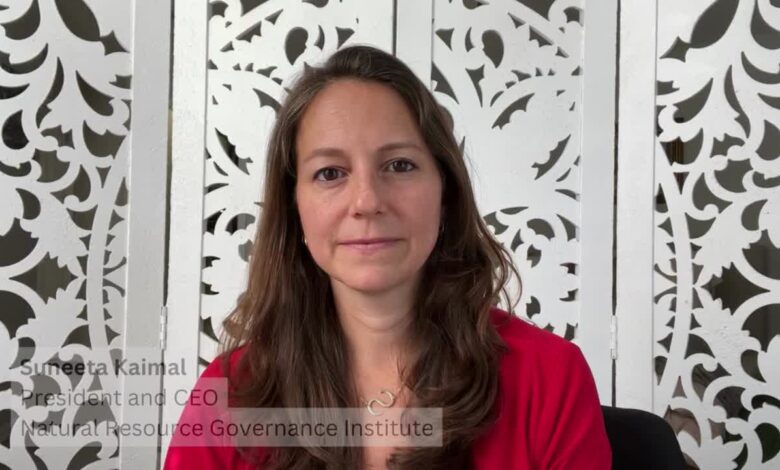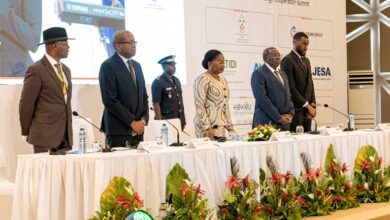Africa Must Rethink Financing Models to Build Inclusive Energy Future – NRGI CEO

Unlocking Africa’s energy future will depend on bold reforms in how the continent mobilizes, manages, and directs financing, Suneeta Kaimal, President and CEO of the Natural Resource Governance Institute (NRGI), has said.
Delivering her keynote at the 2025 Future of Energy Conference in Accra, Kaimal outlined three core solutions that African governments must pursue if they are to close the $500 billion financing gap needed for universal energy access and a sustainable energy transition.
Strategic inclusive just energy transitions
Kaimal stressed that financing will only be effective if it is anchored in national development ambitions and shaped by the voices of local communities. “Successful financing starts with a strategic, inclusive vision for just energy transitions. There is no single path for defining energy and economic futures. Solutions must be context-specific,” she told participants.
She cited Ghana and Nigeria, where NRGI has launched national dialogues to align energy transition plans with public priorities. In Ghana’s oil-producing regions, communities such as fisherfolk, women, and youth are being engaged to ensure their needs are not sidelined. Similarly, in Senegal, civil society groups have been trained to influence consultations on the Just Energy Transition Partnership (JETP), particularly to raise concerns about equity and energy access.
Kaimal explained that such inclusive approaches ensure that scarce financing is directed towards real national priorities, rather than imposed external blueprints.

Changing the color of money
The NRGI CEO argued that Africa must push back against debt-heavy financing models that risk deepening fiscal crises. “Even promising initiatives like Senegal’s JETP risk pushing countries further into the debt trap. Of the pledged financing, only 6.6 percent is in grants while over 80 percent comes as loans,” she warned.
With African governments already spending nearly 17 percent of revenues on debt servicing, she cautioned that piling more loans onto national budgets undermines the very energy investments they are meant to support.
Instead, Kaimal called for fairer lending terms that reflect Africa’s growth potential, combined with technical and technological support to accelerate renewable energy adoption. “We need new models that mobilize private capital without trapping nations in unsustainable debt,” she said.
Reinvigorating domestic resource mobilization
Kaimal urged African countries to leverage their abundant natural resources, particularly critical transition minerals, to create long-term domestic financing streams. Africa holds about 30 percent of the world’s transition mineral reserves, a bargaining chip she said must be used strategically.
She pointed to Zambia’s recent progress in attracting European support for a cobalt refinery and for an interconnector project with Tanzania, which will reduce vulnerability to drought-driven disruptions of hydropower. “Value addition may not be feasible everywhere, but regional collaborations can overcome constraints and help Africa capture more value from its mineral wealth,” Kaimal argued.
By investing in beneficiation, diversifying economies, and developing renewable technologies, countries can reinvigorate public revenues to fund just energy transitions and reduce dependency on external aid.
A call for urgency
Kaimal warned that the window for action is narrowing as global financing priorities shift and energy transitions accelerate elsewhere. She urged African leaders to seize the moment and bring unified demands to global platforms, including the following week’s Second Climate Week in Addis Ababa.
“The influence of rich countries still limits Africa’s financing scale and compromises sovereignty over energy and resources. But opportunities exist to shift the global conversation, particularly on minerals governance and fair financing for just transitions,” she said.
The NRGI CEO added that African leaders have already shown innovation through initiatives like the Seville coalition, which proposed taxing premium air travel to raise sustainable development finance. “By scaling and replicating bold ideas like these, Africa can move beyond aid dependency and ensure that energy transitions deliver genuine economic transformation for its people,” she concluded.
The Future of Energy Conference, hosted by the Africa Centre for Energy Policy (ACEP), brought together policymakers, business leaders, investors, and civil society to explore strategies for mobilizing investment in Africa’s energy transition.



